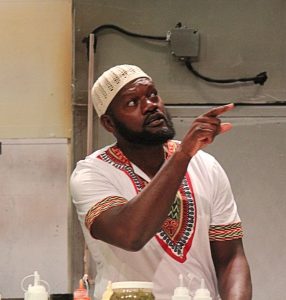In ‘Clyde’s,’ Lynn Nottage captures plight of ex-inmate to re-enter society as productive members
 Lynn Nottage’s contemporary play, Clyde’s, makes its Southwest Florida premiere at The Laboratory Theater of Florida now through August 11th. Director Tijuanna Clemons gives this synopsis of the play’s storyline.
Lynn Nottage’s contemporary play, Clyde’s, makes its Southwest Florida premiere at The Laboratory Theater of Florida now through August 11th. Director Tijuanna Clemons gives this synopsis of the play’s storyline.
“Clyde’s brings to the stage five formerly-incarcerated individuals  that are out and living life and trying to find their way with all of the disruption, all of the barriers that come with being an ex-felon, an ex-con, formerly incarcerated.”
that are out and living life and trying to find their way with all of the disruption, all of the barriers that come with being an ex-felon, an ex-con, formerly incarcerated.”
The action takes place in a truck stop sandwich shop that’s run by Clyde, a mean-spirited ex-con who takes full advantage of her employees’ limited options and opportunities in the local job market. In spite of  her efforts to keep them under her thumb, her enigmatic, Zen-like chef gives the rest of the kitchen staff permission to dream of a better life, symbolized by their quest to create the perfect sandwich.
her efforts to keep them under her thumb, her enigmatic, Zen-like chef gives the rest of the kitchen staff permission to dream of a better life, symbolized by their quest to create the perfect sandwich.
According to Sarasota-based Project 180, over 30,000 Florida inmates are released from prison each year. Many wish to become law-abiding,  productive citizens, but they have few job skills, lack formal education and experience discrimination in housing and job markets because of their felony records. Plagued by unemployment, homelessness and poverty, more than 75 percent rearrested within five years for either violating their probation or committing a new crime.
productive citizens, but they have few job skills, lack formal education and experience discrimination in housing and job markets because of their felony records. Plagued by unemployment, homelessness and poverty, more than 75 percent rearrested within five years for either violating their probation or committing a new crime.
These realities infuse newly-released inmates with a definitive sense of gloom and foreboding that borders on desperation.  The loss of employment doesn’t just mean the inability to pay bills or the specter of homelessness. For those on probation, it could very well spell a return to incarceration as gainful employment is a probationary requirement.
The loss of employment doesn’t just mean the inability to pay bills or the specter of homelessness. For those on probation, it could very well spell a return to incarceration as gainful employment is a probationary requirement.
It falls on the character of Letitia, played by Loyse Michel, to give voice to this angst.
“Seven  months ago, I got out. $75 in my pocket and nobody to hold my hand … You here ‘cause you run out of options. Ain’t nobody gonna hire you except for Clyde. Especially you, the way you is. Because if you here, ya done something. We all done something. And we’re just biding our time ‘till we can get to another place.”
months ago, I got out. $75 in my pocket and nobody to hold my hand … You here ‘cause you run out of options. Ain’t nobody gonna hire you except for Clyde. Especially you, the way you is. Because if you here, ya done something. We all done something. And we’re just biding our time ‘till we can get to another place.”
Project 180 seeks to break this cycle by providing
- workforce education and financial literacy classes for inmates;
- an annual reentry lecture series for the general public;
 information and referrals for felons seeking housing, programs, and employment; and
information and referrals for felons seeking housing, programs, and employment; and- a comprehensive, whole-life residential program for men in recovery.
In Clyde’s, the play’s namesake is a stand-in for the cold, callous social and economic situation that the recently-incarcerated find in the days, weeks and months following their release.
“She  the gatekeeper,” observes Letitia, “and there ain’t no getting around it.”
the gatekeeper,” observes Letitia, “and there ain’t no getting around it.”
No only does Clyde continually remind her employees that they’re marginalized, she insists that they deserve nothing more or better than the ill will and demeaning treatment she gleefully dishes out. She dismisses out-of-hand their dreams of being accepted by and making some meaningful contribution to society, as symbolized by her steadfast refusal to sample even one of the many gourmet sandwiches that Montrellous and his cohorts craft in their quest to create the perfect sandwich.
refusal to sample even one of the many gourmet sandwiches that Montrellous and his cohorts craft in their quest to create the perfect sandwich.
Substance abuse is often involved, either directly or indirectly, in the commission of the crimes for which folks are incarcerated in Florida and the country at large. Staying clean is another condition of probation, and probationers can be required to piss in a cup at any time, including during unscheduled  middle-of-the-night visits that their officers often conduct.
middle-of-the-night visits that their officers often conduct.
Even for those ex-inmates who are not saddled with a probationary term, a relapse can lead to lowered inhibitions and a lapse in judgment that culminates in the commission of another crime.
But it’s not alcohol or drugs at the core of this black hole of recidivism. It’s nihilism born of negativity. Once again, it falls on Letitia to give voice to this phenomenon.
“My  negativity was legendary. … Everyone was responsible for my unhappiness, but me. That darkness is still there, but I can’t let it or anybody get ahold of me.”
negativity was legendary. … Everyone was responsible for my unhappiness, but me. That darkness is still there, but I can’t let it or anybody get ahold of me.”
There’s a reason that Lynn Nottage is the first and only woman to win two Pulitizer Prizes for Drama. While the writing is exemplary, the themes and insights she weaves into  the fabric of Clyde’s defy explanation.
the fabric of Clyde’s defy explanation.
But even a great script needs a visionary director and gifted actors to bring its characters and storyline to life. In that, Southwest Florida audiences are blessed to have Tijuanna Clemons in the chair and Sonya McCarter, Lemec Bernard, Loyse Michel, Waner Del Rosario and Justin Larsche on the boards.  They work in combination to deliver a delectable morsel just like the complimentary ingredients of the proverbial perfect sandwich.
They work in combination to deliver a delectable morsel just like the complimentary ingredients of the proverbial perfect sandwich.
“Clyde’s is a gripping story of systemic oppression and survival, redemption, love, and loving oneself that’s sure to stir the hearts of all,” comments Director Tijuanna Clemons. “Crossing all racial and cultural barriers, Clyde’s pleasantly gives life to the formerly incarcerated by undressing the stereotypes and  putting humanity on display.”
putting humanity on display.”
In the end, Clyde’s is a play about hope, redemption and second chances.
“You are more than your worst last mistake,” adds Clemons.
Clyde’s provides audiences the rare opportunity to walk a mile in the shoes of a felon’s quest for a second chance  and redemption.
and redemption.
Yes, it’s really that sublime.
July 24, 2024.
RELATED POSTS.















 Tom Hall is both an amateur artist and aspiring novelist who writes art quest thrillers. He is in the final stages of completing his debut novel titled "Art Detective," a story that fictionalizes the discovery of the fabled billion-dollar Impressionist collection of Parisian art dealer Josse Bernheim-Jeune, thought by many to have perished during World War II when the collection's hiding place, Castle de Rastignac in southern France, was destroyed by the Wehrmacht in reprisal for attacks made by members of the Resistance operating in the area. A former tax attorney, Tom holds a bachelor's degree as well as both a juris doctorate and masters of laws in taxation from the University of Florida. Tom lives in Estero, Florida with his fiancee, Connie, and their four cats.
Tom Hall is both an amateur artist and aspiring novelist who writes art quest thrillers. He is in the final stages of completing his debut novel titled "Art Detective," a story that fictionalizes the discovery of the fabled billion-dollar Impressionist collection of Parisian art dealer Josse Bernheim-Jeune, thought by many to have perished during World War II when the collection's hiding place, Castle de Rastignac in southern France, was destroyed by the Wehrmacht in reprisal for attacks made by members of the Resistance operating in the area. A former tax attorney, Tom holds a bachelor's degree as well as both a juris doctorate and masters of laws in taxation from the University of Florida. Tom lives in Estero, Florida with his fiancee, Connie, and their four cats.